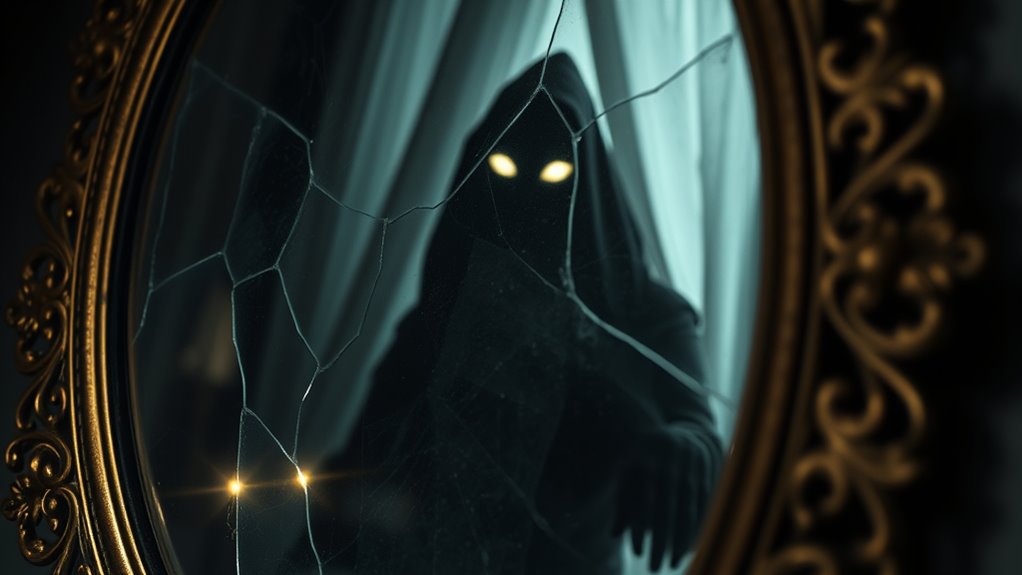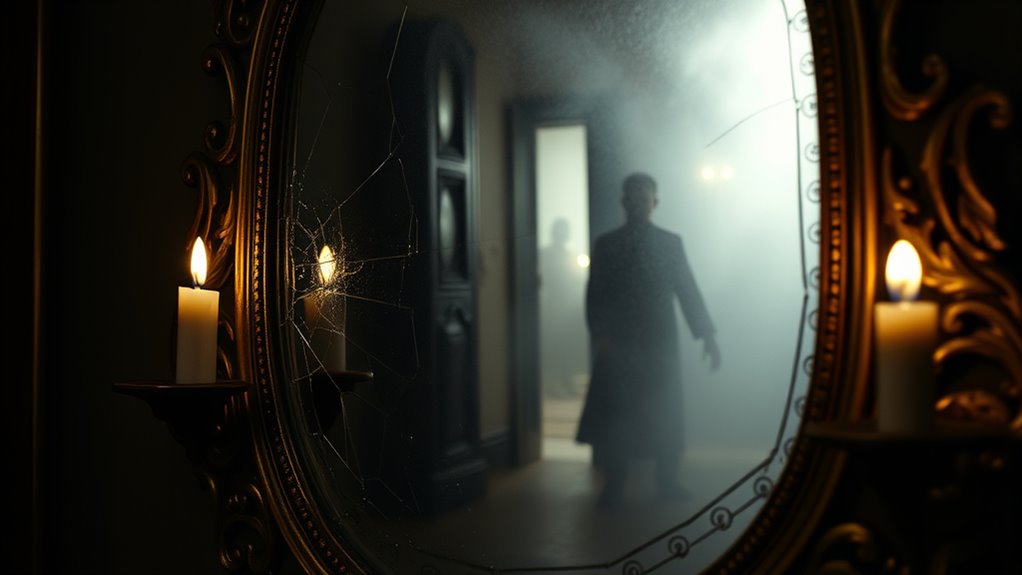Mirrors have long held a mystical reputation as portals to other worlds, revealing hidden truths, omens, and spirits. Many believe breaking a mirror brings seven years of bad luck because it traps part of your soul, while careful handling can protect you from negative energies. They serve as symbols of mystery, used in rituals, and are thought to absorb or deflect harmful forces. Stay with us to explore the fascinating folklore behind these reflective gateways.
Key Takeaways
- Mirrors are viewed as portals to other worlds, believed to connect the physical and spiritual realms.
- Breaking a mirror is thought to bring seven years of bad luck due to trapped spirits.
- Mirrors are considered omens, revealing hidden truths or glimpses of the future, especially at midnight.
- Used in rituals for protection, they are believed to ward off evil spirits and absorb negative energy.
- Folklore depicts mirrors as active participants in spiritual stories, embodying mystery, fears, and cultural symbolism.

Have you ever wondered why mirrors have held such powerful and sometimes eerie significance in folklore? Throughout history, people have attributed mysterious qualities to reflective surfaces, leading to a variety of superstitions involving mirrors. In many cultures, mirrors are seen as more than mere objects; they’re believed to be portals to other worlds, vessels that can trap spirits, or sources of bad luck if mishandled. This cultural significance of reflective surfaces often stems from their ability to reveal hidden truths or to act as gateways between the physical and spiritual domains. Such beliefs have persisted across generations, shaping how societies view mirrors and their power.
Mirrors have long been seen as portals to other worlds and vessels for trapped spirits.
Superstitions involving mirrors are widespread and often cautionary. For example, breaking a mirror is thought to bring seven years of bad luck, a superstition rooted in the idea that mirrors not only reflect a person’s image but also trap parts of their soul. This belief encourages careful handling and respect for mirrors, especially in households where superstitions are taken seriously. Some cultures even believe that placing a mirror incorrectly or facing it toward a doorway can invite negative spirits or misfortune into the home. These superstitions often serve to reinforce the idea that mirrors are more than simple reflective surfaces—they are active participants in our spiritual environment.
In addition, there are beliefs that mirrors can reveal truths that are hidden from plain sight. For instance, some traditions hold that gazing into a mirror at midnight might allow you to see a glimpse of your future or discover a secret about yourself. Others think that mirrors can act as protective talismans, warding off evil spirits when positioned correctly or covered during storms or funerals. The cultural significance of reflective surfaces extends to rituals and practices, where mirrors are used in cleansing or spiritual protection. In some cultures, they are believed to absorb negative energy, thereby safeguarding the household or individual from harm.
Ultimately, the folklore surrounding mirrors reflects a deep human fascination with the unknown and the unseen. You might look at a mirror as just a tool for appearance, but historically, it’s been viewed as a gateway, a mirror of the soul, and a symbol of mystery. Its cultural significance of reflective surfaces reveals a universal desire to understand what lies beyond ordinary perception. These superstitions continue to influence how we view these everyday objects, reminding us that beneath the surface of a simple mirror lies a world of stories, fears, and hopes that stretch back through centuries of human belief.
Frequently Asked Questions
Are There Cultural Differences in Mirror Folklore Worldwide?
Yes, there are cultural differences in mirror folklore worldwide. You’ll find varied symbolism, like mirrors representing truth in Western traditions, while in Chinese folklore, they’re believed to ward off evil spirits. Folklore variations also include beliefs about mirrors revealing souls or acting as portals to other worlds. These differences reflect each culture’s unique worldview, emphasizing how mirrors serve as powerful symbols across diverse societies, shaping their superstitions and myths.
Can Mirrors Actually Influence or Predict Future Events?
Mirrors can’t actually influence or predict future events, but superstitions about reflections and mirror divination techniques suggest otherwise. Many believe that by gazing into a mirror or using specific methods, you can glimpse future possibilities or uncover hidden truths. While there’s no scientific proof, these beliefs persist across cultures, making mirrors powerful symbols in folklore. So, if you’re curious, exploring these superstitions can be a fascinating way to connect with tradition.
What Are the Psychological Effects of Mirror Gazing?
Mirror gazing is like looking into a mirror’s hidden depths, affecting your self-awareness and visual perception. It can boost confidence or trigger anxiety, revealing parts of yourself you might not normally see. Prolonged reflection may lead to obsession or distorted self-image, impacting mental health. You might experience heightened introspection, but also emotional discomfort. Use it mindfully, knowing that what you see can influence how you perceive yourself and the world around you.
How Do Mirrors Relate to Spiritual or Paranormal Experiences?
Mirrors often symbolize supernatural reflections and serve as gateways to other domains in many traditions. When you look into a mirror, you might experience paranormal sensations or see visions that suggest a connection to spirits or unseen worlds. This mirror symbolism indicates that reflections can act as portals, revealing or summoning supernatural entities. Such experiences often blur the line between the physical and spiritual, deepening your connection to the mystical.
Are There Rituals to Protect Against Mirror-Related Bad Omens?
Around 60% of people believe in mirror-related omens, so mirror shielding rituals are common. You can place protective symbols, like crosses or salt lines, in front of mirrors to ward off negative energies. Some also cover mirrors during thunderstorms or after a loved one’s passing. These omen warding practices aim to neutralize bad luck and keep your space spiritually safe, giving you peace of mind whenever reflections might hold hidden dangers.
Conclusion
As you step away from the shimmering surface, remember that mirrors are more than just glass—they’re gateways to mysteries and whispers of the past. Their reflective depths hold secrets and omens, inviting you to gaze beyond the surface into worlds unseen. The next time you catch your reflection, feel the silent stories waiting behind the glass, beckoning you to explore the enchanting, shadowy domain where folklore and reality intertwine in shimmering silence.









